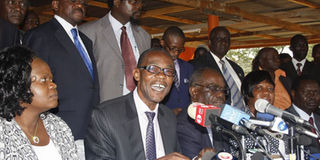Blow to President Kenyatta as court outlaws Aaron Ringera team

Tongaren MP Eseli Simiyu (centre) and other Cord leaders during a press briefing at Orange House, Nairobi on December 3, 2013. The coalition supported the court’s ruling in the dispute between the Executive, the Judiciary and Parliament. PHOTO | ANN KAMONI
What you need to know:
- The opposition coalition, Cord, threw its weight behind the ruling
- The six commissioners will continue in office since their suspension has been quashed
President Uhuru Kenyatta suffered his first major legal setback on Tuesday when a court quashed the appointment of a tribunal he had set up to investigate six members of the Judicial Service Commission.
(VIDEO: Ahmednassir, 5 others back in office)
Judge George Odunga, sitting in Nairobi, said the appointment of the tribunal was in breach of the Constitution and therefore null and void.
“The action by his Excellency the President of appointing the tribunal was undertaken in breach of the orders of this court and that action may be well null, void and of no effect,” said Mr Justice Odunga. “It is as if it was never done in the first place and never existed.”
Retired judge Aaron Ringera was to chair the tribunal. (READ: Uproar as Uhuru goes for Judiciary)
The opposition coalition, Cord, which was holding its parliamentary group meeting in Nairobi, threw its weight behind the ruling.
“We support the ruling by the High Court on the Judicial Service Commission case. It is a move in the right direction and we are now urging the President to respect it,” said Dr Eseli Simiyu, who spoke on behalf of the coalition. “Let him now wait for the outcome of the court case.”
The ruling means that the tribunal cannot start its work until a case filed by the Judicial Service Commission is determined.
It also means that the six commissioners, Mr Ahmednasir Abdullahi, the Rev Samuel Kobia, Prof Christine Mango, Ms Emily Ominde and Ms Florence Mwangangi, will continue in office since their suspension has been quashed.
“Permitting the tribunal to commence its duties would not only amount to abetting and aiding disobedience of court orders but may end up being a waste of public funds,” the judge said. “It is therefore in the interest of justice that the tribunal be told to hold their horses to avoid the uncertainty of whether they can safely proceed while a case challenging the very basis of their appointment is ongoing.” (READ: Jubilee senators say formation of Ringera tribunal was constitutional)
VICTORY FOR JSC
The judge’s decision was a victory for the JSC against the Executive and Parliament in the dispute over the suspension of the six commissioners.
When he appointed the Ringera tribunal, President Kenyatta was acting on the recommendation of the National Assembly, which according to the Judiciary, had debated the matter in disregard of a court order barring such a debate. MPs recommended that the six be suspended and investigated for impropriety and for attempting to block a fraud investigation into a Sh80 million case involving the Judiciary.
On Tuesday, Mr Justice Odunga said it did not matter whether the President was unaware of the court order barring the removal of the six commissioners. And even if he was, this did not sanitise the illegal action of suspending them and forming a tribunal.
He also allowed JSC to amend its petition against the National Assembly to include Mr Ringera and the other members of his tribunal, Mr Ambrose Weda, Ms Jennifer Shamalla and Mr Mutua Kilaka as respondents.
In defending his decision to quash the suspension of the six commissioners, the judge said: “The JSC is tasked with ensuring smooth administration of justice and suspending six members will hamper it operations. I am not concerned about the allegations made against them but the risk of bringing the JSC to a halt.”
Chief Justice Willy Mutunga is the chairman of the JSC. The law requires the 11-member commission to have a quorum of six.
On the separation of powers, Mr Justice Odunga hit out at the Executive for trying to meddle in the affairs of the Judiciary.
“Kenya has chosen the path of democracy rather than dictatorship and we must stick to the rule of law even if those who are mighty and powerful ignore our decisions forgetting that they are the ones who would run and seek the court’s protection when circumstances have changed,” he said.
He also warned that courts would not entertain any move to belittle the Judiciary.
“In an effort to restore our place, the Judiciary’s image has been tremendously enhanced and any move likely to erode that confidence ought to be treated with cynicism,” he said.
He also acknowledged that the dispute between the three arms of government had raised weighty constitutional issues which were beyond a single judge and required three judges.
“The issues raised are substantial questions of law with respect to interpretation of the Constitution with regard to relationships between the three arms of government and the separation of powers. I, therefore, forward the file to the Chief Justice to consider constituting a three-judge bench to determine the dispute,” he ruled.





